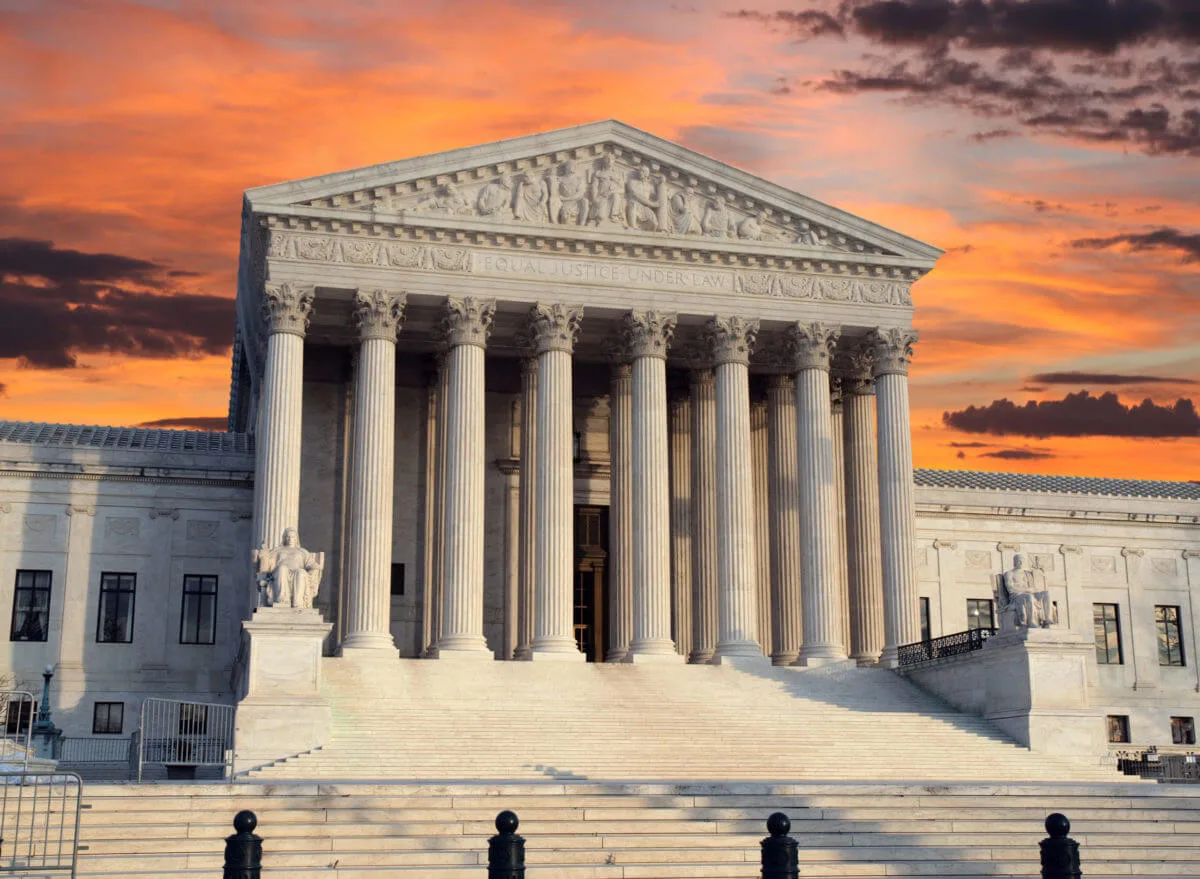
Image via Shutterstock
The Supreme Court began its new term this week with two conservatives justices blasting the decision that made marriage equality the law of the land. Here’s what else to look out for this fall.
The Supreme Court kicked off its new term this week with a jolt of divisiveness: Conservative Justice Clarence Thomas, joined by Justice Samuel Alito, made clear their criticisms of the landmark case that extended marriage rights to same-sex couples.
Commenting on an appeal from the former county clerk in Kentucky who famously objected to issuing marriage licenses to same-sex couples, Thomas wrote in a statement that the 5-4 majority in the 2015 Obergefell v. Hodges had “read a right to same-sex marriage” into the Constitution, “even though that right is found nowhere in the text.” He also said that the decision “enables courts and governments to brand religious adherents who believe that marriage is between one man and one woman as bigots.”
Thomas suggested the court needs to revisit the issue because it has “created a problem that only it can fix.” Until then, he said, the case will continue to have “ruinous consequences for religious liberty.”
In response, Human Rights Campaign President Alphonso David said that Justices Thomas and Alito had “renewed their war on LGBTQ rights and marriage equality.”
Sorting Fact From Fiction: Sign Up for COURIER’s newsletter.
The Court also reinstated a requirement that South Carolina residents voting by mail in November’s election must get a witness to sign their ballots. Democrats had sought to have the requirement put on hold because of the coronavirus pandemic, but Republicans had defended it as deterring fraud.
Meanwhile, Senate Republicans are still pushing to fill the vacancy left by Justice Ruth Bader Ginsburg even as two GOP members of the Senate Judiciary Committee have tested positive for the coronavirus. The days-long hearing to confirm Judge Amy Coney Barrett to the Supreme Court is scheduled to begin Oct. 12.
Beyond Monday’s action-packed kickoff, there are a number of incoming cases that will outline how a conservative majority may impact generations of American law. Those cases will address LGBTQ rights, the Affordable Care Act, presidential powers, and more. Here’s a brief look at a few being heard in the next few weeks:
- Trump v. New York (Oct. 7): The Supreme Court will review an appeal from the White House administration that would exclude undocumented immigrants from the calculations used to apportion congressional seats, shifting both political power and federal money from Democratic states to Republican ones.
- Fulton v. City of Philadelphia (Nov. 4): The Court will determine whether private, taxpayer-funded organizations are allowed to waive discrimination clauses. The case stems from Catholic Social Services, which was hired by Philadelphia to provide foster care services to wards, rejecting same-sex couples as potential adoptive parents. If upheld, the case could open the door for foster care providers, food banks, homeless shelters, and other service providers to deny services to people who are LGBTQ, Muslim, or Jewish.
- Affordable Care Act in California v. Texas (Nov. 10): The Court will consider whether states may challenge the minimum coverage provision, or individual mandate, which requires that most people must maintain a minimum level of health insurance coverage. Those who refused faced a financial penalty. In 2019, the 5th Circuit U.S. Court of Appeals ruled that the individual mandate is no longer constitutional. If the Court strikes down the ACA, the damage to the national health care system will be immeasurable, and a host of ACA provisions, such as protections for people with pre-existing conditions, could be lost.
- DOJ v. House Committee on the Judiciary (Dec. 2): The Court will hear whether Congress is permitted to access the Mueller report in its entirety. The Democrat-led committee requested access to secret grand jury materials referenced in Special Counsel Robert Mueller’s report about his investigation into possible Russian interference in the 2016 election. The US District Court for the District of Columbia agreed, and in March the DC Circuit court affirmed the lower court’s decision. On June 1, the US Department of Justice appealed the decision, disputing that a potential US Senate impeachment trial counted as a judicial proceeding, and therefore the disclosure of secret grand jury materials should not be allowed.
- Collins v. Mnuchin (Dec. 9): The Court will further refine the extent of the president’s powers to appoint and remove leaders and exert control over independent federal agencies. The Federal Housing Finance Agency worked with the US Department of the Treasury to change how private shareholders of Fannie Mae and Freddie Mac are compensated when the companies make a profit. The shareholders sued, arguing that the change was beyond the powers of the FHFA and the Treasury and that the structure of the FHFA was unconstitutional.
The eight justices may also be asked to weigh in on potential election issues, as an unprecedented number of Americans will vote by mail and the president sows distrust in the electoral process.
“The constant refrain about claims of fraud in mail voting seem calculated to set up the prospect of some kind of extended post-election squabble, and there may not be anybody else but the justices to handle it,” Paul Smith of the Campaign Legal Center told NBC News.
READ MORE: With RBG Gone, the Affordable Care Act Faces Its Greatest Threat Yet.

Stay safe, Puerto Rico: The governor issues a state of emergency due to heavy rains, flooding
The executive order also authorizes the activation of the National Guard to assist in relief efforts. The Guard will be tasked with providing...

Jennifer López and Bad Bunny steal the spotlight at Met Gala 2024
The artists were co-chairs of the event, alongside Zendaya and Chris Hemsworth. Rauw Alejandro also attended. Puerto Rican artists Jennifer López...

More than a restaurant: The story behind Tacos & Tattoos
Business owners often lead lives filled with challenges, and the story of Tacos & Tattoos (TNT) is no exception. However, its founder, Jonathan...

2024 in pop culture: In a bruising year, we sought out fantasy, escapism—and cute little animals
By JOCELYN NOVECK AP National Writer NEW YORK (AP) — I'll get you, my pretty! And your little pygmy hippo, too! Forgive us the shameless attempt to...



